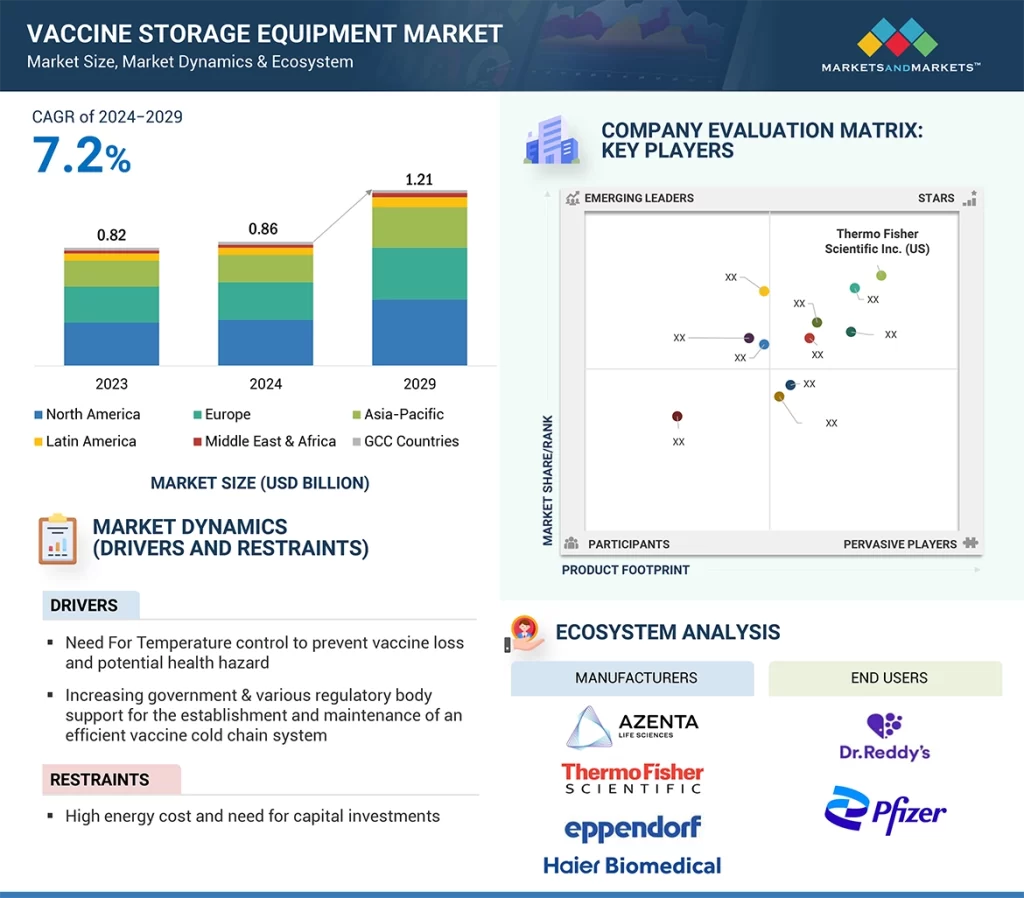The global vaccine storage equipment market, valued at US$0.82 billion in 2023, is forecasted to grow at a robust CAGR of 7.2%, reaching US$0.86 billion in 2024 and an impressive US$1.21 billion by 2029.

Global Vaccine Storage Equipment Market Dynamics:
DRIVER: Increasing government & regulatory support for establishing and maintaining vaccine cold chain systems
The growth of the vaccine storage equipment market is fuelled by the increasing government & various regulatory body support for establishing and maintaining an efficient vaccine cold chain system. The increasing collaborations and resource distribution targeted at bolstering vaccine cold chain infrastructure, government backing, and favorable regulations have driven the demand for vaccine storage equipment. Governments worldwide are collaborating with organizations to ensure vaccinations are carried out and kept in the best possible conditions.
RESTRAINT: High energy costs and need for capital investments
The high energy consumption and significant initial capital investment required for vaccine storage equipment present a major restraint to market growth. Medical freezers, consuming between 1,200 and 6,000 kWh annually, account for energy usage 2 to 10 times that of an average household. Healthcare facilities, particularly those with limited resources, suffer financial challenges due to the high operating expenses brought on by this significant power requirement. These state-of-the-art vaccination storage equipment come with an upfront expense, which adds to the burden.
OPPORTUNITY: Rising disease prevalence to boost demand for vaccination and storage equipment
The growth of vaccine storage equipment is fueled throughout the forecast period by the increasing prevalence of diseases such as dengue, influenza, tuberculosis, malaria, Zika virus, chikungunya, pneumonia, and HIV. To prevent these diseases, vaccination is essential, and maintaining the effectiveness of vaccines throughout storage and transport requires dependable storage equipment.
CHALLENGES: Environmental concerns regarding greenhouse gas emissions.
Refrigerators and freezers, essential for vaccine storage and transport, contribute to global greenhouse gas emissions, including carbon dioxide, methane, and fluorinated gases. Medical refrigerators are included in the 5% of greenhouse gas emissions from the healthcare industry worldwide. Healthcare facilities are adopting energy-efficient equipment that produces little to no greenhouse gases.
Regional Insights:
Asia Pacific region is the fastest growing region in vaccine storage equipment market. The APAC vaccine storage equipment market is projected to reach USD 0.28 billion by 2029, at a CAGR of 8.5% during the forecast period.
Europe is the second largest regional market for vaccine storage equipment, due to the increasing investment by key players in the region.
Future Outlook:
Advancements in Battery-Powered Cold Storage
New battery-powered refrigeration solutions will reduce reliance on electricity, making vaccine storage more efficient in remote areas.
Expansion of Global Cold Chain Infrastructure
Governments and private investors will continue investing in cold chain logistics, ensuring vaccines reach people safely and effectively.
Sustainable and Eco-Friendly Solutions
With growing concerns about environmental sustainability, manufacturers are focusing on energy-efficient and eco-friendly refrigeration technologies.
Increased Focus on AI & Data Analytics
AI-driven predictive maintenance and real-time monitoring will optimize vaccine storage efficiency and reduce waste.
Conclusion
The vaccine storage equipment market is witnessing rapid growth due to increasing global immunization programs, the demand for COVID-19 vaccines, and advancements in cold chain technologies. While challenges such as high costs and power supply issues remain, technological innovations and strategic partnerships are expected to drive market expansion.
As the world moves towards better-prepared healthcare systems, investment in efficient, reliable, and sustainable vaccine storage solutions will be crucial for ensuring global health security.
